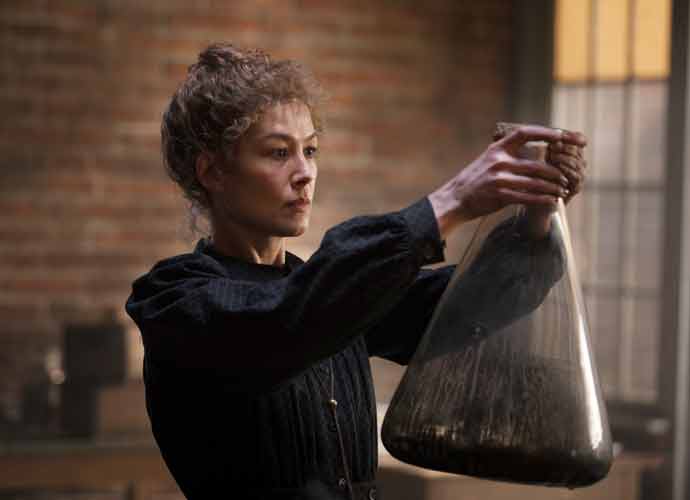‘Radioactive’ Movie Review: Marie Curie Biopic Plays It Safe

3/5
Biopics are among the most difficult movie genres to critically pin down: they’re often competently made, generally interesting, and feel as valuable as the historical heft of their subject matter. After a while, though, you start to get the sense that you haven’t really watched a movie – you’ve simply read a particularly engaging Wikipedia summary.
Such is the sense one gets from director and graphic novelist Marjane Satrapi‘s recent attempt to tackle the life of Marie Curie, Radioactive. The film is competent in all ways and certainly demonstrates the facts of Curie’s life in an engaging manner, but it ends up feeling as though something is missing at the center of it all.
Rosamund Pike delivers a perfectly by-the-numbers performance as Curie, leaning into the “socially deficient scientist” stereotype long displayed in films like The Imitation Game. Sam Riley does a slightly better job as her husband, though this might simply be because Pierre Curie is a more complexly drawn character in the film – his love of science is idiosyncratically mixed with a desire for fame, acclaim, and the occult. Unfortunately, he’s dead before the movie’s halfway mark.
The audience is whisked through Curie’s decades-long career in the sciences, with so little time dedicated to each individual chapter that her Nobel prize wins are made to feel like afterthoughts. In a matter of minutes, she goes from despised by the Sorbonne department of sciences to the most famous chemist in all of Paris and back again. It could all be described as “breakneck” if it were particularly entertaining.
Instead, it’s oozing with mediocrity. It’s hard to deny that Curie’s life has some real points of emotion in it (ones that the film does a good job highlighting), but beyond them everything is presented with such cookie-cutter predictability that it’s hard to feel anything but ambivalence toward this film. It’s at its best right at the end, as Curie’s daughter (a curiously underused Anya Taylor-Joy) convinces her to join the French war effort near the conclusion of her life. It’s a compelling and unexpected last-minute shift.
I am also loath to mention the movie’s haphazard jumps forward in time, where it shows Curie’s scientific discoveries being used for cancer treatments in Ohio and atomic bomb testing at Los Alamos. The message here is clear, but the delivery is fumbled – we don’t need a film to lecture us on how radiation is both good and bad at the same time.
Radioactive had more than enough to work with in its subject matter, but the final product feels cold and clinical in its style. One day we’ll get the Marie Curie biopic we deserve, but this film has probably pushed that day back a few decades.
RELATED ARTICLES
Get the most-revealing celebrity conversations with the uInterview podcast!







Leave a comment